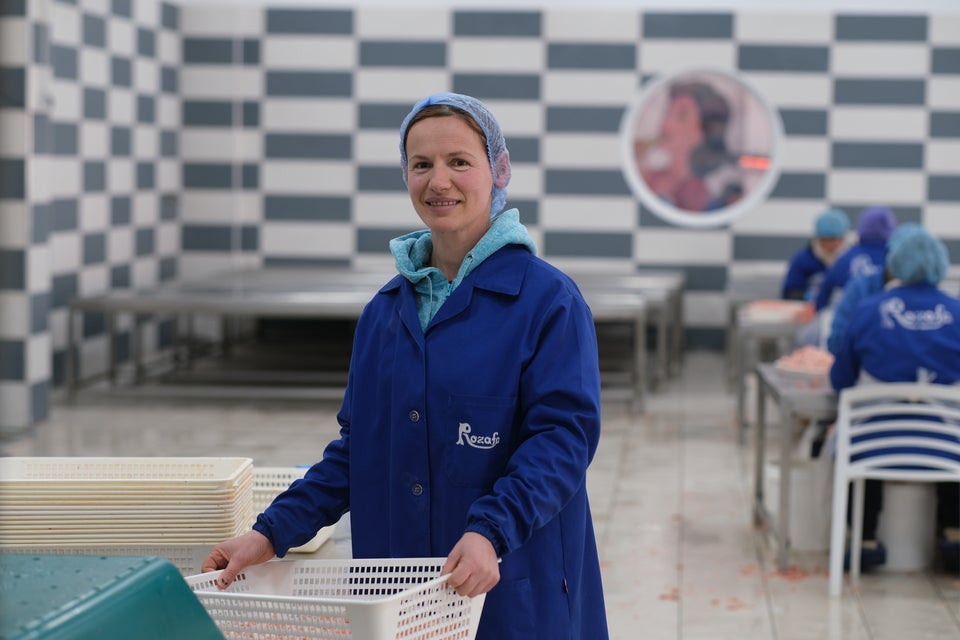Transforming lives in rural Albania
How is gender-responsive budgeting (GRB) contributing to the lives of families in Albania's local communities? UN Women has been championing GRB over the years, resulting in an increase of budget allocations for gender equality. During the past three years, through funding from the Government of Sweden, UN Women has collaborated with local governments and strategic partners, such as civil society organizations and the private sector carrying out initiatives that empower women and entire local communities, fostering economic development across rural areas.
Date:

A woman going to work is not a common sight in Prrenjas, a small town in Eastern Albania, about 100 km from the country’s capital. In this area, particularly among people living in villages, women often work the land or take care of their families, constrained by a lack of employment opportunities, limited public transport, and prevailing societal attitudes. Alketa Haxholli, however, has challenged this mindset. After years dedicated to raising her children, who are now five and ten years old, she made the bold decision to enter the workforce for the first time in her life.
"I learned about this job opportunity through a friend. The company even arranged transportation from our village. Living three kilometers from town, finding a job used to be impossible for me," Alketa Haxholli shares, as she reflects on her employment at the fish factory where she has been working for over six months now.
Following a campaign of concerted lobbying by the Municipal Council, various food processing companies in Prrenjas now provide transportation for women from remote villages who are interested and eager to work in gainful employment. This move has proven transformative, enabling over 70 women to get employment with these companies in the past two years.
Ertjola Leka, Deputy Head of the Prrenjas Municipal Council, notes a shift in mindset: "Previously, women preferred economic aid to employment. Now, the transportation plan has become a significant motivator. The companies arrange pickups from each village."
This change began when Ertjola Leka engaged in training and mentorship programs offered by UN Women, focusing on applying gender-responsive budgeting (GRB) within local budgets. From 2020 to 2023, over 500 officials from local government authorities enhanced their skills in embedding specific gender-related objectives in their Gender Equality Plans and Social Plans. UN Women has offered ongoing technical support to promote gender equality and the "leaving no one behind" principle among vulnerable populations.
The initiative is part of the regional program “Transformative Financing for Gender Equality,” funded by the Government of Sweden, which aims to encourage national and local governments to incorporate gender equality principles into public finance and oversight.
In 2022 alone, municipalities budgeted and launched 63 concrete initiatives, including projects for women's economic empowerment, infrastructure enhancements aimed at improving the welfare of women and girls, safer streets initiatives, and the establishment of new kindergartens and heating systems. Municipal Councils, Women’s Councils, and CSOs in 30 municipalities across Albania, which have had the benefit of these trainings, now view gender-responsive budgeting as a vital strategy in combating gender inequalities.
Ertjola Leka appreciates the training and the partnerships it helped foster with local organizations, leading to the advancement of initiatives such as provision of transportation for rural women. Municipal councilors are playing a crucial role in this respect, having incorporated 16 gender-sensitive initiatives into the annual municipal budgets nationwide.
These efforts are contributing to the advancement of women's rights, their empowerment, and are challenging societal gender stereotypes. Initially, Alketa Haxholli’s husband was resistant to her getting employment, but she stood firm.
“Men often prefer their wives not to work outside the home, but I insisted. Now, six months on, I can even socialize with friends and colleagues without any problem,” Alketa says, looking even happier than ever before.
Diamanta Vito, UN Women consultant on Local Governance, says that women and girls she and her colleagues work with at the grassroot level understand that it is challenging, but they are embracing the transformative power of gender budgeting. “By actively engaging in the process, they are not only shaping policies but they are also reshaping their own destinies, creating a future where equality and opportunity are not just ideals but tangible realities," Diamanta Vito says.
UN Women has a long history of mainstreaming gender-responsive budgeting in Albania, which has contributed to a number of laws regulating the application of GRB in medium-term and annual budget planning. Through UN Women support, the Government included gender equality as one of the principles in its planning and budgeting process, which has resulted in an increase over the years. Currently, there are 53 engendered budget programs out of 128.
“Transformative Financing for Gender Equality”, funded by the Government of Sweden is being implemented in Albania, Bosnia and Herzegovina, Kosovo, Republic of North Macedonia, and Serbia.